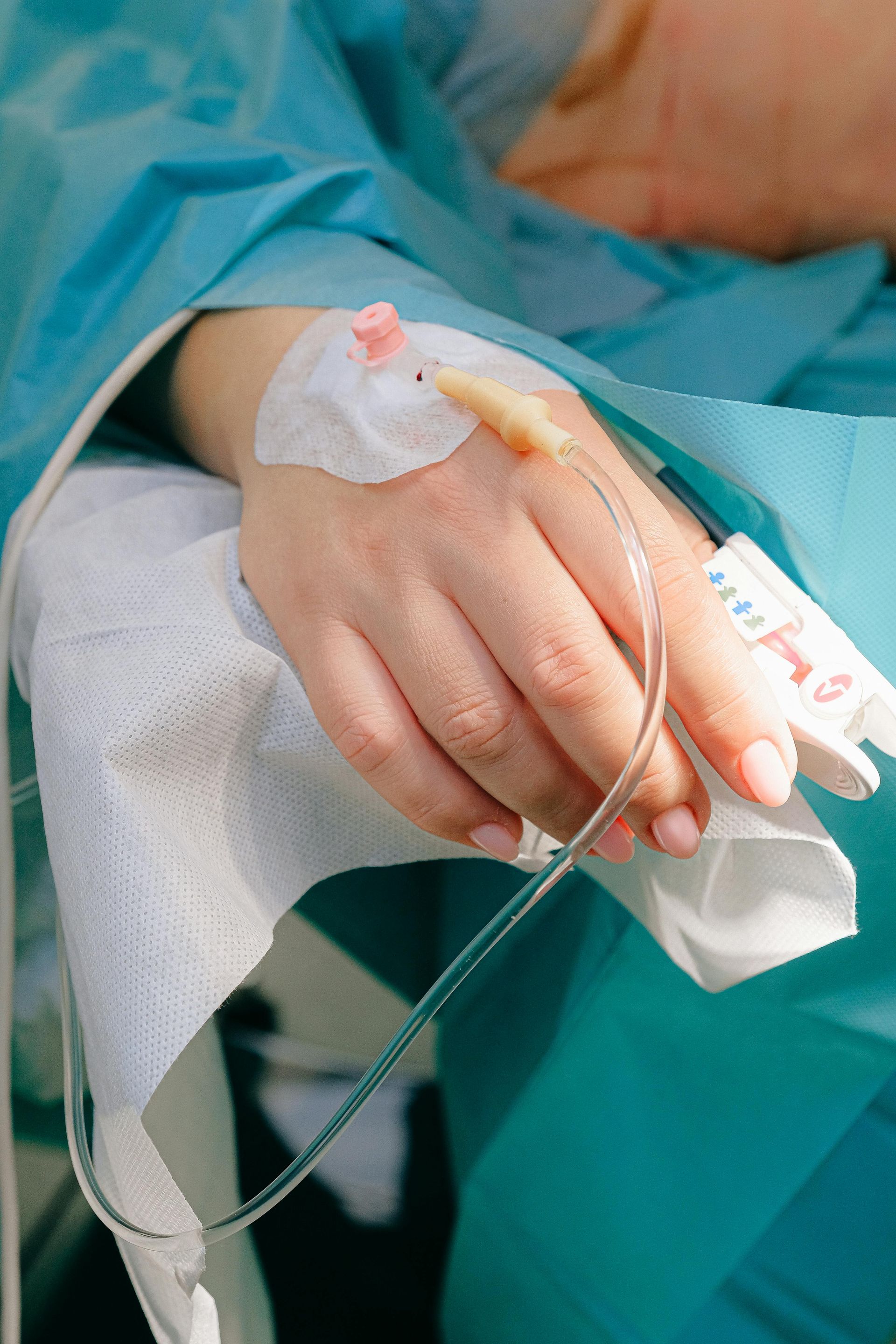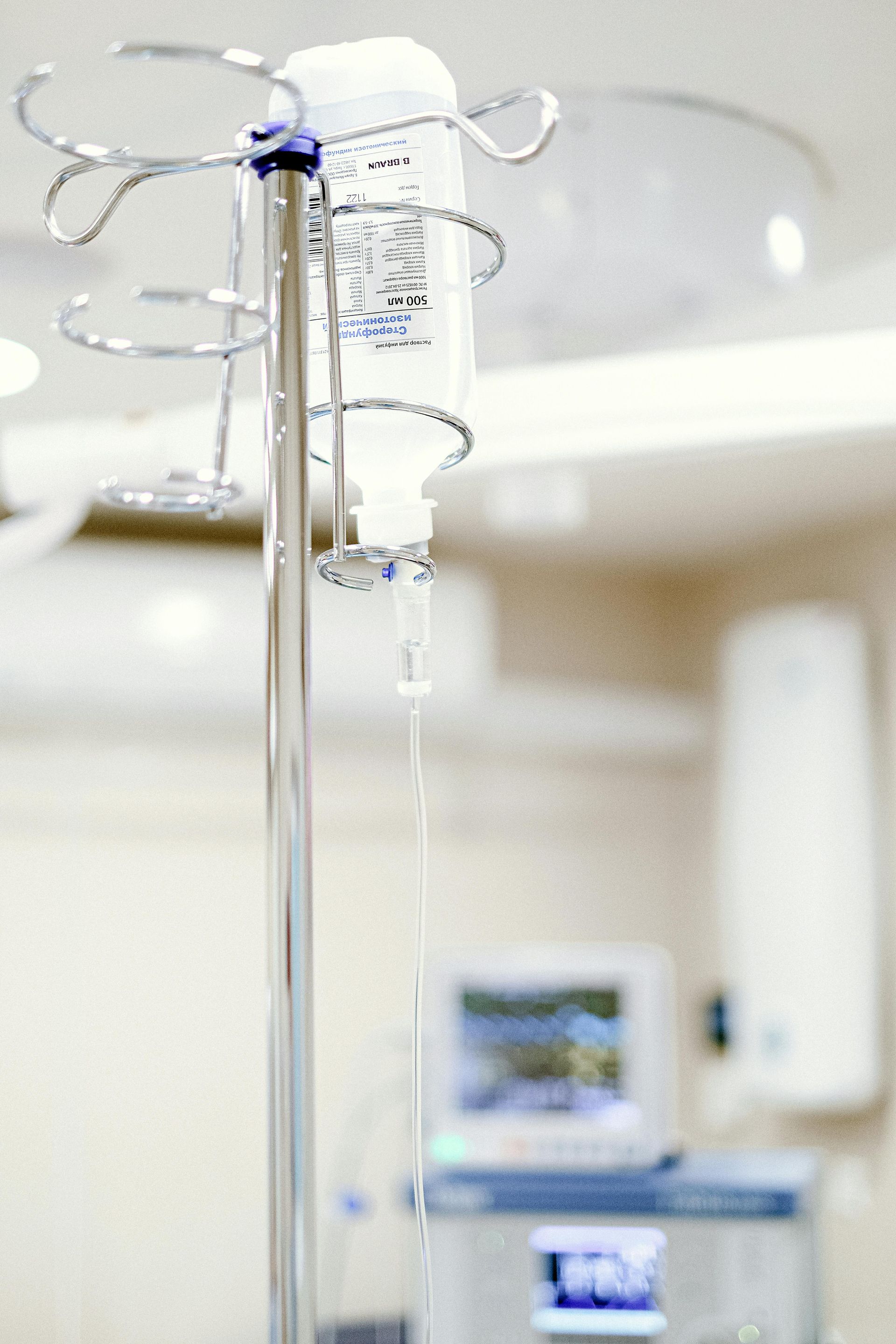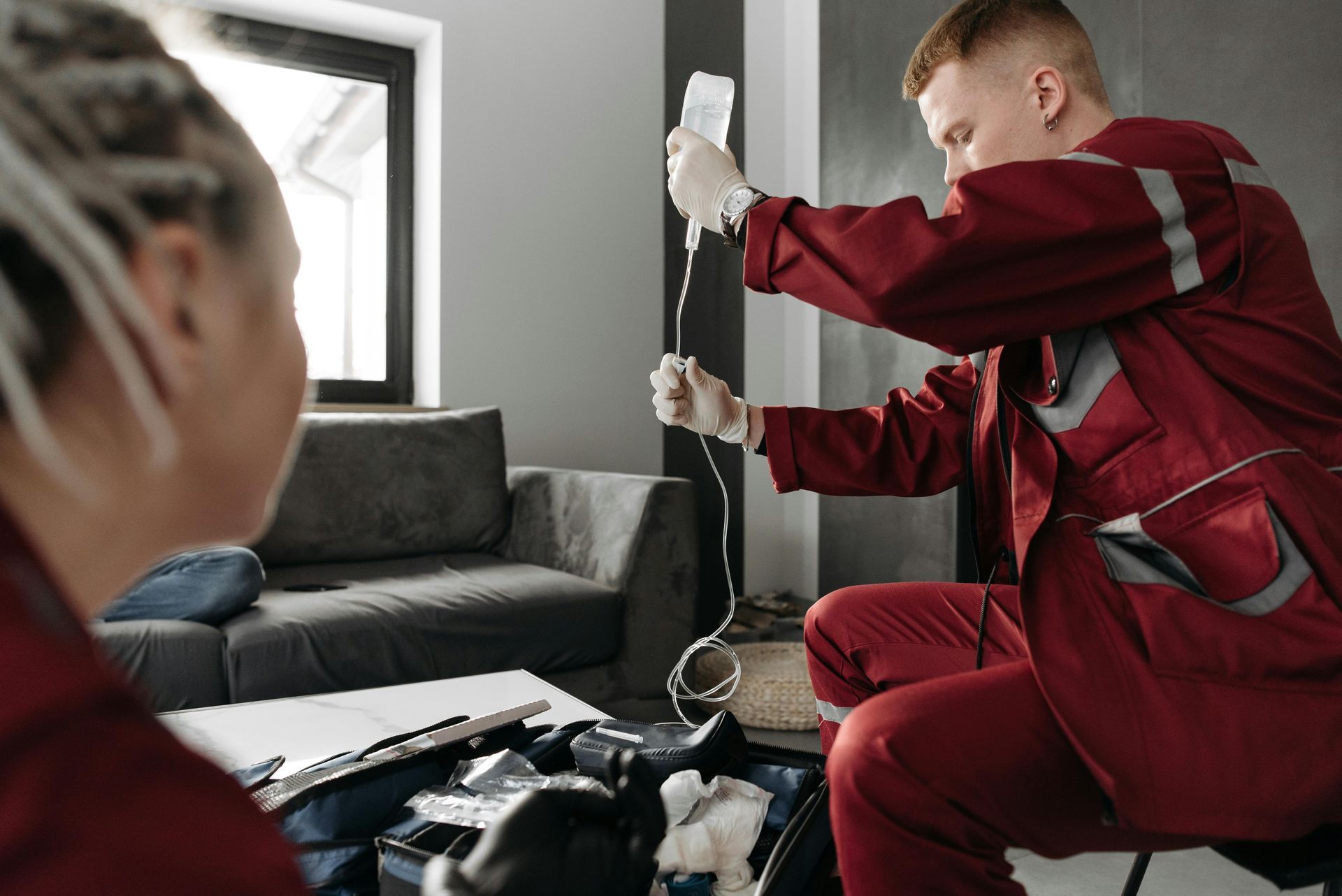Does an IV Drip Help Hangovers? Fast, Targeted Symptom Relief

Medically reviewed by Micaela Strevay, FNP-C, PMHNP-BC
Table of Contents
The Truth About IV Drips and Hangover Relief
Does an IV drip cure a hangover? The short answer is no—IV drips don't cure hangovers, but they can provide rapid relief from dehydration-related symptoms like headaches, fatigue, and nausea.
Quick Facts:
- ✅ What IV drips CAN do: Rapidly rehydrate and replenish electrolytes
- ✅ Symptoms they help: Headache, thirst, dry mouth, fatigue, muscle cramps
- ❌ What they CAN'T do: Speed up alcohol metabolism or eliminate all hangover causes
- ❌ Limitations: Don't address light sensitivity, memory issues, or sleep disturbances
We've all been there—after a night out celebrating, you wake up feeling like "very small porcupines are bouncing in your stomach" with a pounding headache that makes even thinking painful. The hangover IV industry has exploded across Arizona and beyond, promising quick fixes for about $200 that can supposedly act like a "whoops button" for your night of overindulgence.
The science is more complex than the marketing suggests. Hangovers result from multiple factors: dehydration from alcohol's diuretic effects, toxic byproducts like acetaldehyde, immune system inflammation, and disrupted sleep. While IV therapy addresses dehydration quickly by delivering fluids directly into your bloodstream, it can't speed up your liver's ability to process alcohol or fix all the underlying causes.
Recent data from Hangover Heaven shows 97.94% of over 1,000 patients reported improvement in overall hangover scores after IV therapy. Yet medical experts classify these treatments as "boutique" or elective services rather than standard medical protocol—there's still a lack of large-scale controlled studies supporting their effectiveness.
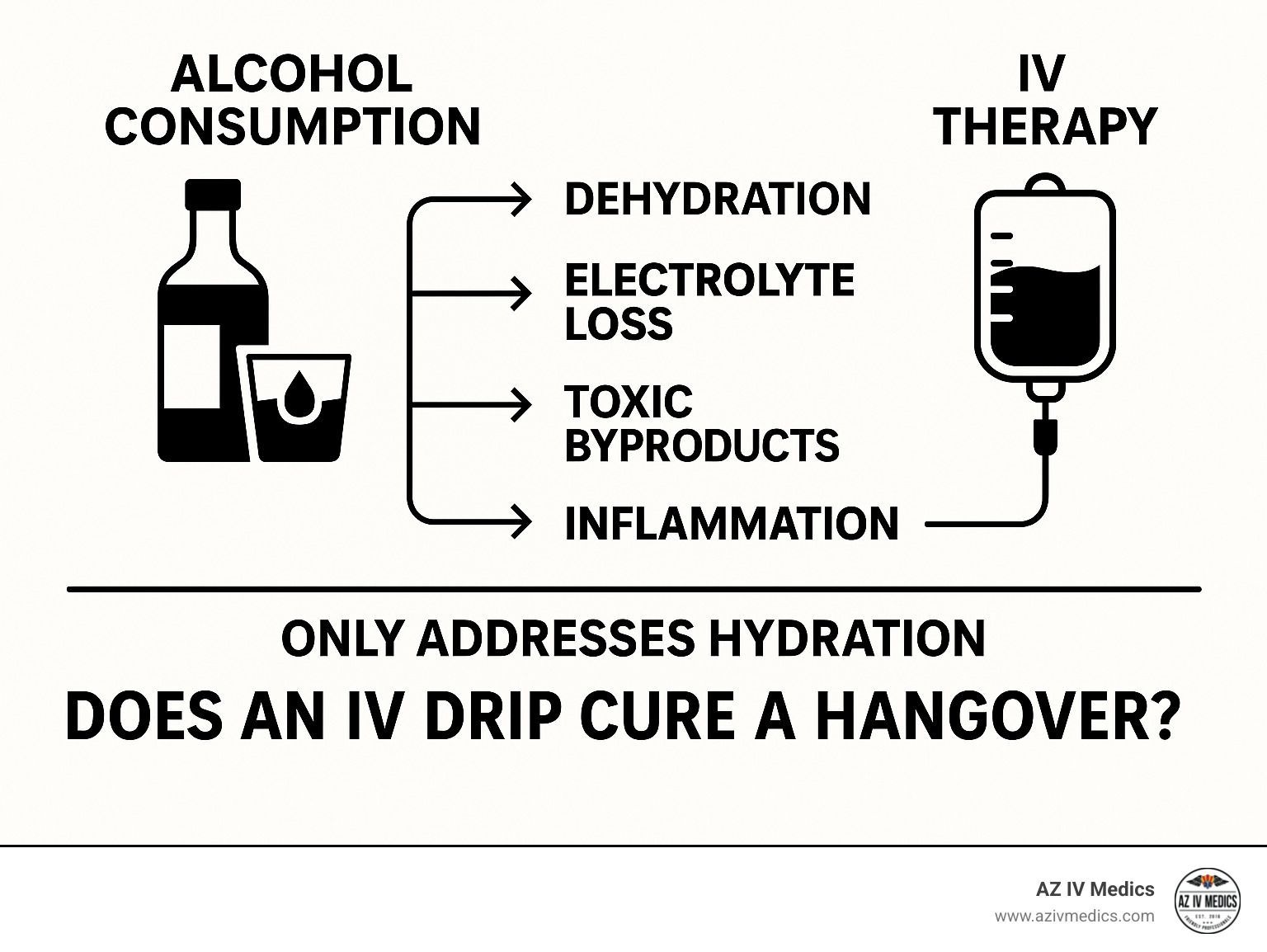
How Do Hangovers Actually Happen?
If you've ever wondered why you feel like you've been hit by a truck after a night out, you're not alone. The truth is, hangovers are your body's way of staging a full-scale revolt against last night's fun—and understanding this process helps explain whether an IV drip can actually cure a hangover.
When alcohol enters your system, it immediately starts messing with your body's delicate balance. One of the first casualties is vasopressin, a hormone that tells your kidneys to hold onto water. Alcohol essentially tells vasopressin to take a break, which is why you find yourself making frequent trips to the bathroom all night long.
This isn't just about losing water—you're also flushing out essential electrolytes like sodium, potassium, and magnesium that keep your muscles, nerves, and brain functioning properly. By morning, you're running on empty in more ways than one.
But here's where it gets interesting: dehydration is only part of your hangover story. Scientists have finded that your immune system plays a starring role too. When your body detects alcohol, it releases inflammatory compounds called cytokines—the same chemicals that make you feel awful when you have the flu.
These cytokines peak right around the time your blood alcohol drops to zero, usually 12-16 hours after drinking. That's why you feel worst in the morning rather than while you're still buzzed. Your immune system is essentially treating alcohol like an invader and launching a full inflammatory response.
Congeners—those flavor compounds in darker liquors like whiskey and red wine—make everything worse. They're byproducts of fermentation that add character to your drink but misery to your morning. This is why vodka hangovers tend to be gentler than bourbon hangovers.
Don't forget about sleep quality either. Even though alcohol might knock you out, it wreaks havoc on your natural sleep cycles, leaving you tired and foggy even after eight hours in bed.
Alcohol's Chain Reaction in the Body
Your liver works overtime to process alcohol, but it can only handle about one standard drink per hour—no matter how tough you think you are. During this metabolic marathon, your liver produces acetaldehyde, a toxic compound that's actually more harmful than alcohol itself.
Think of acetaldehyde as alcohol's evil twin. It's what makes you feel genuinely poisoned, causing nausea, headaches, and that overall sense that something is very wrong with the world. Your body eventually breaks it down further, but not before it does some damage.
Meanwhile, alcohol metabolism creates oxidative stress—basically flooding your cells with harmful free radicals. Your blood sugar also takes a nosedive as your liver prioritizes processing alcohol over maintaining steady glucose levels. This double whammy leaves you feeling weak, shaky, and completely drained.
Key Symptoms You Feel in the Morning
The classic hangover hits you with a perfect storm of misery. Headaches come from a combination of dehydration, blood vessel changes, and those inflammatory cytokines we mentioned earlier. It's like your brain is staging its own protest march.
Nausea and vomiting are courtesy of acetaldehyde toxicity and stomach irritation—your digestive system's way of saying "never again" (until next weekend). Fatigue stems from poor sleep quality, low blood sugar, and the cellular damage from all that oxidative stress.
Then there's "hangxiety"—that weird combination of anxiety and depression that can hit even the most confident people the morning after drinking. Scientists think this might be related to neurotransmitter imbalances as your brain chemistry tries to rebalance itself.
You might also experience muscle aches, sensitivity to light and sound, brain fog, and irritability. Basically, your entire body is working overtime to recover from what it considers a chemical assault—which explains why the promise of quick IV relief sounds so appealing when you're in the thick of it.
Does an IV Drip Cure a Hangover?
Let's cut straight to the chase here. Does an IV drip cure a hangover completely? No, it doesn't work like magic to erase every trace of last night's poor decisions. But can it make you feel dramatically better? Absolutely—and often faster than you might expect.
Think of it this way: your hangover is like a house fire with multiple causes. IV therapy is excellent at putting out the dehydration flames, but it can't fix everything that's burning. The good news? Dehydration is often the biggest culprit behind that pounding headache and overwhelming fatigue.
When you get an IV drip, fluids and electrolytes go directly into your bloodstream, bypassing your digestive system entirely. This means near-100% absorption compared to the measly 20-50% you get from chugging water or sports drinks. Your body gets what it needs immediately, not after waiting for your stomach to slowly process everything.
The rapid rehydration helps dilute those nasty alcohol metabolites still floating around in your blood and quickly restores the electrolyte balance that alcohol disrupted. Many people describe feeling their headache lift and energy return within the first 30 minutes of treatment.
But here's the reality check: your liver still processes alcohol at its own pace—roughly one drink per hour—regardless of how well-hydrated you are. IV fluids also can't undo the inflammatory response or repair cellular damage from oxidative stress. They're incredibly effective at what they do, but they're not miracle workers.
Does an IV Drip Cure a Hangover: What Science Says
Here's where things get a bit frustrating for anyone wanting definitive answers. We don't have large randomized controlled trials proving IV therapy works for hangovers. Most research comes from emergency rooms, where doctors routinely give IV fluids for severe alcohol intoxication—though recent studies suggest this might not actually speed up recovery time.
Medical experts often label hangover IV therapy as "boutique" or elective treatment rather than standard medical care. Without peer-reviewed studies, we're largely relying on real-world data from commercial providers and countless personal testimonials.
That said, the science behind it makes perfect sense. We know dehydration causes many hangover symptoms. We know IV fluids rehydrate faster than oral methods. The missing piece is large-scale studies confirming that faster rehydration translates to meaningful relief that's worth the cost and potential risks.
The placebo effect also plays a role here. When you're paying $200 for treatment and lying in a comfortable chair receiving medical care, you might feel better partly because you expect to. That doesn't make the relief any less real for the person experiencing it.
Does an IV Drip Cure a Hangover: Real-World Outcomes
While we wait for more formal research, the real-world data is pretty compelling. Analysis of over 1,000 patients showed some impressive numbers: 97.9% reported improvement in their overall hangover symptoms, with similar rates for nausea and headache relief.
Most people feel noticeably better within 30-60 minutes of starting treatment. That's dramatically faster than oral rehydration, which can take several hours to show effects. Many clients report that the relief lasts well into the following day, helping them get back to normal activities much sooner.
The anecdotal reports are consistently positive across different providers and locations. People describe going from "feeling like death" to "human again" during a single treatment session. While we should always consider selection bias—happy customers are more likely to leave reviews—the consistency of these reports suggests genuine benefit.
Severe hangovers seem to respond particularly well. Patients rating their hangover as a 10 out of 10 often drop to a 3 or less after treatment. That's the difference between calling in sick to work and being able to function normally.
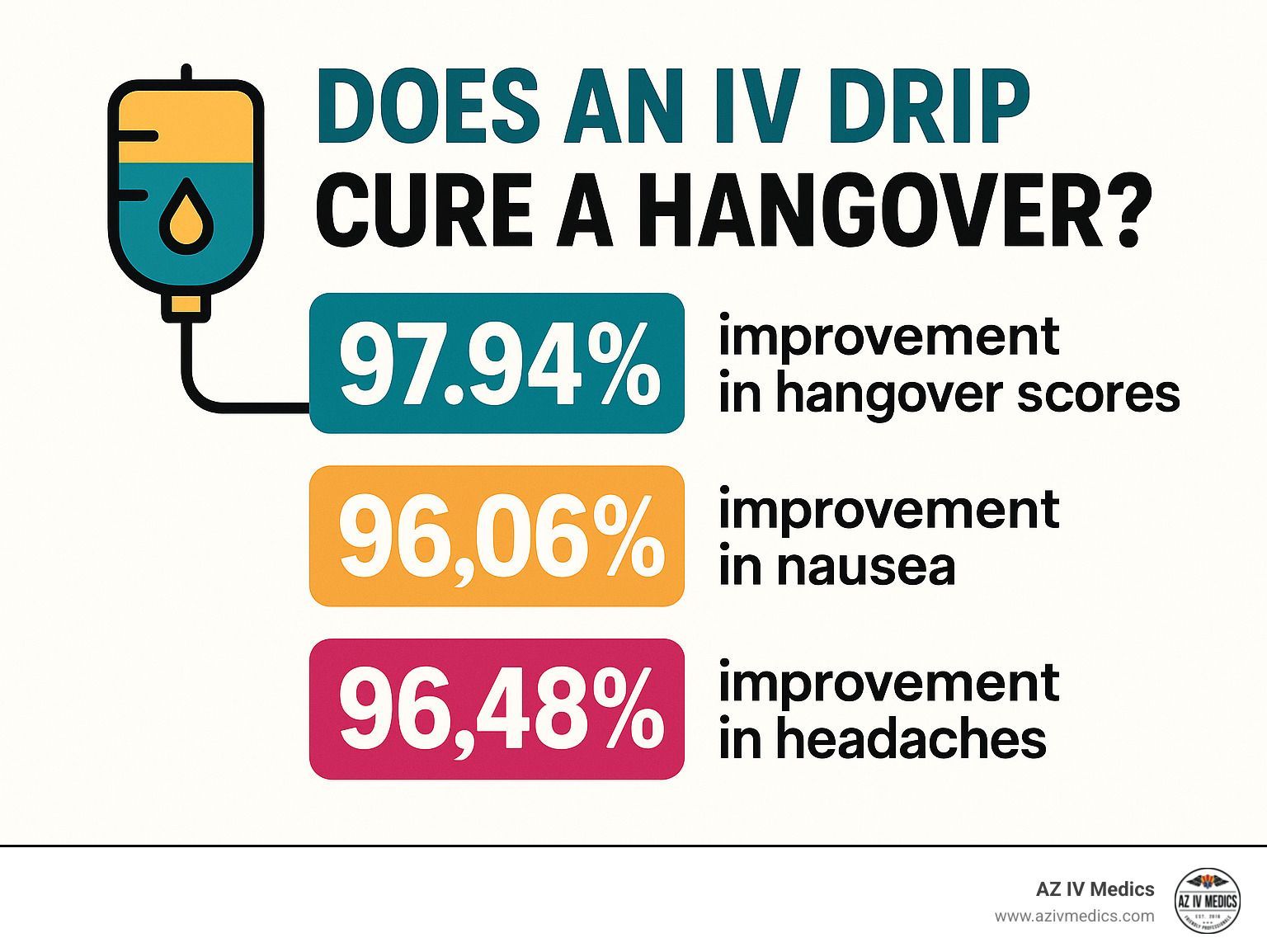
What's Inside a Hangover IV Drip?
When you're wondering does an IV drip cure a hangover, it helps to understand exactly what's flowing into your veins. The magic—or science—is in the combination of ingredients designed to tackle different aspects of your misery.
The foundation is usually normal saline (that's just sterile salt water) or Lactated Ringer's solution, which sounds fancy but is basically balanced fluid that contains sodium, potassium, calcium, chloride, and lactate. Think of this as the delivery truck that carries everything else where it needs to go.
But the real action happens with the add-ons. B-complex vitamins are often the stars of the show since alcohol depletes these essential nutrients faster than you can say "one more round." Your body burns through B vitamins processing alcohol, so replenishing them can help restore energy and support nerve function. Vitamin B12 specifically targets that bone-deep fatigue, while vitamin C acts as an antioxidant to help fight the cellular damage from your night out.
Magnesium is another heavy hitter—it helps with muscle function and can provide significant headache relief. Many people are already magnesium-deficient, and alcohol makes it worse, so this mineral often provides noticeable benefits.
For detox support, many drips include glutathione, a powerful antioxidant that your liver uses to break down toxins. Some providers add NAC (N-acetylcysteine), which specifically helps your body process acetaldehyde—that nasty compound we talked about earlier that makes you feel poisoned.
The symptom-specific medications can be game-changers. Anti-nausea medication like Zofran can stop that queasy feeling in its tracks, while anti-inflammatory drugs tackle both headaches and the general inflammation causing your misery.
Here's what you might find in a typical hangover IV:
- Base fluid (saline or Lactated Ringer's)
- B-complex vitamins and B12
- Vitamin C and magnesium
- Glutathione for liver support
- Anti-nausea and pain medications as needed
The beauty is that many providers let you customize based on your specific symptoms. Feeling more nauseous than usual? Extra anti-nausea medication. Killer headache? Additional magnesium and pain relief. It's like a personalized rescue mission for your body.
More info about IV therapy packages shows how these treatments can be custom to individual needs while maintaining proper medical oversight—because even hangover relief should be done safely.
IV Hydration vs. Oral Rehydration: Benefits, Risks & Limits
When you're lying in bed feeling like death warmed over, the question becomes: does an IV drip cure a hangover better than chugging water and sports drinks? The answer depends on how miserable you are and what you can actually keep down.
The biggest advantage of IV therapy is speed and certainty. While oral rehydration relies on your digestive system—which may not be cooperating when you're nauseous—IV fluids go straight into your bloodstream. This means 100% bioavailability compared to the 20-50% absorption rate you get from drinking fluids.
IV therapy delivers rapid relief within 30-60 minutes, while oral rehydration can take several hours to show meaningful effects. When you can't keep anything down or have an important meeting in two hours, that speed difference matters enormously.
But let's talk about the cost reality. IV hangover therapy typically runs $100-$400 per session, while aggressive oral rehydration might cost you $10-20 in sports drinks and electrolyte packets. For many people dealing with mild to moderate hangovers, drinking plenty of fluids with electrolytes can provide similar relief—it just takes longer.
The infection risk with IV therapy is minimal when performed by licensed professionals using proper sterile technique, but it's still a consideration. There's also the potential for fluid overload or electrolyte imbalances if too much fluid is given too quickly, especially in people with heart or kidney conditions.
Here's the honest truth: if you can keep fluids down and have the time to wait, oral rehydration often works nearly as well. Sports drinks, oral rehydration salts, or even good old-fashioned chicken broth can provide significant relief. The key is starting early and being consistent.
Scientific research on oral vs IV fluids suggests that while IV therapy works faster, the end result may be similar for patients who can tolerate drinking fluids.
Who Should Consider—or Avoid—IV Hangover Therapy?
IV therapy makes the most sense when you're dealing with severe nausea and can't keep anything down. If you're a busy professional with back-to-back meetings and feel like you've been hit by a truck, the rapid relief can be worth the investment. Some people also find that oral rehydration just doesn't cut it for their severe symptoms.
You should think twice if you have kidney disease or heart conditions that affect how your body handles fluids. Pregnant or breastfeeding women should avoid hangover IV therapy entirely. Anyone taking medications that affect fluid balance—like certain blood pressure medications or diuretics—should consult their doctor first.
Minors typically can't receive these services, as most providers require patients to be 18 or older, though some allow treatment with parental consent.
The bottom line is simple: if you have underlying health conditions or take medications regularly, talk to your healthcare provider before getting IV therapy. It's generally safe for healthy adults, but everyone's situation is different.
Potential Side Effects You Should Know
Most people sail through IV therapy with minimal issues, but it's worth knowing what to expect. Mild discomfort or bruising at the injection site is common—think of it like getting blood drawn. You might feel a cool sensation running up your arm as the fluids go in, and some vitamins can cause a brief metallic taste in your mouth.
Serious complications are rare when treatment is performed by licensed professionals. Phlebitis (vein inflammation) can occur but is uncommon with proper technique. Infection at the injection site is possible but minimal with sterile procedures.
Allergic reactions to medications or additives can happen, which is why reputable providers always ask about allergies and monitor you during treatment. Fluid overload is a concern for people with heart or kidney problems, but healthy adults typically handle the fluid volume without issues.
The key is choosing licensed medical professionals who follow proper protocols. This isn't the place to cut corners with unlicensed providers offering bargain prices—your safety is worth the investment in quality care.
Alternatives & Prevention Strategies That Work
Let's be honest—does an IV drip cure a hangover is the wrong question when you're lying in bed at 2 PM wondering why you thought that last round was a good idea. The better question is: what can you do right now that actually works?
Start with what's in your kitchen. Water mixed with electrolytes can work wonders when you drink it consistently. Sports drinks, coconut water, or even a pinch of salt in water helps restore what alcohol flushed out of your system. The key is drinking small, frequent sips rather than chugging a whole bottle and immediately throwing it back up.
For that pounding headache, ibuprofen or aspirin are your friends—but skip the acetaminophen (Tylenol) while your liver is still processing alcohol. Your liver has enough work to do without adding more stress. A cool, dark room becomes your sanctuary when even the thought of sunlight makes you want to crawl under the covers permanently.
Food might be the last thing you want, but your body needs it. Toast, crackers, or bananas help stabilize your blood sugar without overwhelming your already-angry stomach. Think bland and boring—this isn't the time for your usual breakfast burrito trip.
Prevention really is your best strategy, though we know that's not always realistic when you're celebrating a promotion or your friend's birthday. Pacing yourself at one drink per hour gives your liver time to keep up. Eating a substantial meal before drinking isn't just old wives' wisdom—it actually slows alcohol absorption and reduces peak blood alcohol levels.
Clear spirits like vodka contain fewer congeners than whiskey or red wine, which means potentially milder hangovers. Alternating alcoholic drinks with water throughout the night helps maintain hydration, though we admit this requires more willpower than most people have after drink number three.
Getting adequate sleep after drinking is crucial, even though alcohol disrupts your natural sleep cycles. Your body does its best healing work during rest, so don't fight the urge to sleep in the next day if possible.
More info about hangover management covers these strategies in detail, plus some you might not have considered.
Can an IV Drip Prevent a Hangover?
Some people swear by "pre-party" IV drips—loading up on fluids and vitamins before a night out. The theory makes sense: start well-hydrated and give your body extra resources to handle what's coming.
The reality is more complicated. While starting hydrated is better than starting dehydrated, there's limited evidence that pre-drinking IV therapy significantly prevents hangovers. Your body can only store so much water, and alcohol's effects go far beyond simple dehydration.
Think of it like wearing a raincoat in a hurricane—it might help a little, but you're still going to get wet. Your lifestyle choices remain the primary factors determining how you'll feel the next morning. How much you drink, what you eat, and how well you sleep matter more than any pre-party preparation.
Pre-hydration (whether through IV or aggressive water drinking) may give you a slight edge, but it's definitely not a free pass to drink without consequences. Your liver still processes alcohol at the same fixed rate regardless of how many vitamins are floating around in your bloodstream.
Frequently Asked Questions about IV Hangover Therapy
How quickly will I feel better after an IV?
The relief timeline is honestly one of the most impressive things about IV therapy. Most people start feeling better within 30-60 minutes of beginning their treatment, which is dramatically faster than waiting for oral medications or fluids to kick in.
Here's what typically happens: Your headache often improves first as proper hydration reaches your brain. Then you'll notice your energy returning and that awful nausea starting to fade. The entire IV session takes about 45-60 minutes, and the effects usually carry you through the rest of the day and sometimes into the next.
That everyone responds differently. If you're severely dehydrated or had an especially rough night, it might take the full hour to feel significantly better. But most of our clients are amazed at how much more human they feel by the time we're packing up our equipment.
Are IV hangover drips covered by insurance?
Unfortunately, no—insurance companies don't cover hangover IV treatments because they're classified as elective or "boutique" services rather than medical necessities. You'll be paying out of pocket, with costs typically ranging from $100 to $400 per session depending on what's included in your treatment.
Think of it like a spa service rather than a medical procedure from an insurance perspective. While the medical benefits are real, insurance companies view hangovers as preventable conditions rather than illnesses requiring treatment.
Some providers offer package deals or membership programs if you think you might use the service regularly, though we'd gently suggest that frequent need for hangover IVs might be worth examining from a lifestyle perspective.
How often is it safe to get an IV for hangovers?
This is a great question that doesn't have a simple medical guideline since does an IV drip cure a hangover therapy isn't standard medical protocol yet. For healthy adults, occasional use—maybe once a month or less—is generally considered safe.
The bigger concern isn't really the IV itself, but what frequent use might indicate. If you're needing hangover relief every weekend, that could signal drinking patterns worth discussing with a healthcare provider. Your liver and overall health will thank you for addressing the root cause rather than just treating the symptoms.
From a purely medical safety standpoint, repeated needle sticks can cause vein damage over time, and there's always a small infection risk with any IV procedure. We recommend viewing IV therapy as an occasional rescue remedy rather than a regular part of your weekend routine.
If you're in Arizona and facing one of those "never drinking again" mornings, AZ IV Medics can come to you wherever you are—no travel fees, no waiting rooms, just professional relief delivered to your door.
Conclusion
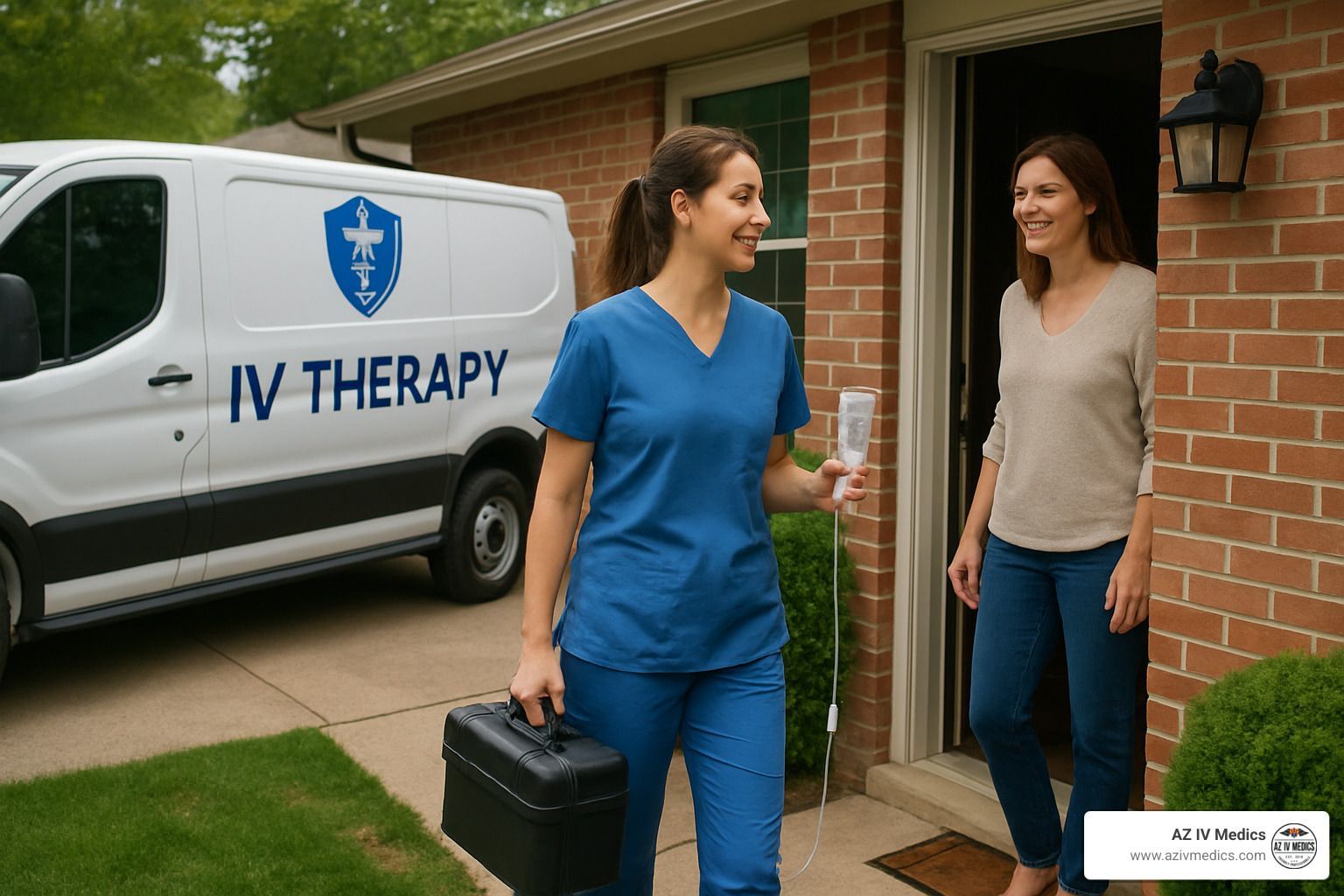
Let's be honest about the big question: does an IV drip cure a hangover? The straight answer is no—not in the way a cure would completely eliminate all symptoms and make you feel brand new. But here's what IV therapy can do: provide real, rapid relief from the worst hangover symptoms, especially those nasty headaches, crushing fatigue, and relentless nausea that make you feel like you've been hit by a truck.
The numbers speak for themselves. Over 97% of patients report meaningful improvement after IV therapy, with most feeling better within an hour. That's pretty impressive when you're lying in bed wondering if you'll ever feel human again.
But let's talk reality for a moment. IV therapy can't magically speed up your liver's processing of alcohol—that happens at its own stubborn pace no matter what you do. It also won't fix everything that went wrong during your night out, like the inflammatory response or cellular damage from too many margaritas.
At AZ IV Medics, we bring professional IV therapy directly to you throughout Phoenix, Scottsdale, Mesa, Tucson, and Flagstaff. Our 100% mobile service means no travel fees and no waiting rooms when you can barely lift your head off the pillow. We show up at your home, office, or hotel with everything needed to help you feel better fast.
Here's the thing though—we believe in giving you the whole picture, not just the marketing pitch. The most effective hangover strategy will always be moderation. When that ship has already sailed (we've all been there), aggressive oral rehydration often works nearly as well as IV therapy if you can keep fluids down.
IV therapy really shines when you're severely dehydrated, can't stop throwing up, or have an important meeting in a few hours and need to function like a normal human being. It's also worth considering when traditional remedies just aren't cutting it and you need comprehensive symptom relief.
Whether you choose our IV therapy or stick with the tried-and-true remedies, make the decision that's right for your situation, your budget, and your health. And remember—no treatment is a free pass to drink irresponsibly. Your liver (and your future self) will thank you for making smarter choices next time.
More info about IV therapy packages to explore our medically supervised hangover relief options delivered anywhere across Arizona.


